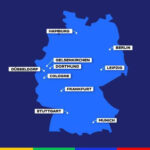Germany proudly hosted UEFA EURO 2024, marking its first major international tournament as host since the memorable 2006 FIFA World Cup. Spanning ten vibrant host cities across the nation, the tournament showcased world-class football in iconic stadiums. From the bustling capital of Berlin to the historic city of Cologne and beyond, each venue offered a unique experience for fans and players alike.
This guide delves into each of the Euro 2024 Stadiums, providing detailed information on their capacity, history, notable events hosted, and local attractions in their respective cities. Whether you’re a football enthusiast, a travel planner, or simply curious about the venues that staged this prestigious tournament, this comprehensive overview is your perfect resource to explore the heart of EURO 2024.
Berlin: Olympiastadion Berlin
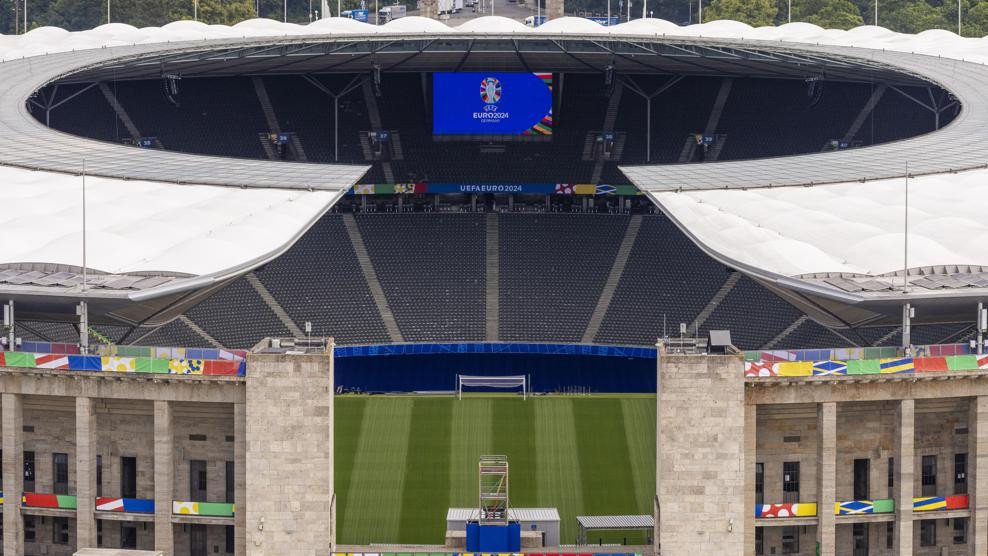 Olympiastadion Berlin – A panoramic view of the stadium showcasing its track and field layout and blue seating under a cloudy sky.
Olympiastadion Berlin – A panoramic view of the stadium showcasing its track and field layout and blue seating under a cloudy sky.
Berlin, the capital of Germany since reunification in 1990, stands as a vibrant hub of history and culture. A city brimming with landmarks, top tourist attractions include the iconic Brandenburg Gate and the soaring 368m TV Tower, which provides breathtaking panoramic views from its observation deck. Adding to its allure, Berlin was a key host city for EURO 2024, with matches played at the legendary Olympiastadion Berlin.
Olympiastadion Berlin: History and Key Features
- Stadium Capacity: 71,000
- Home Team: Hertha Berlin
- Notable Events Hosted: 2006 FIFA World Cup Final, 2015 UEFA Champions League Final
The largest stadium for EURO 2024, Olympiastadion Berlin has been a central figure in German sports history. It has consistently hosted the German Cup final since 1985 and has been the stage for numerous significant international and continental matches. The stadium famously hosted the 2006 World Cup final, where Italy triumphed over France, and nine years later, witnessed Barcelona’s victory against Juventus in the 2015 UEFA Champions League final.
EURO 2024 Matches in Berlin
- 15/06: Spain 3-0 Croatia
- 21/06: Poland 1-3 Austria
- 25/06: Netherlands 2-3 Austria
- 29/06: Round of 16 – Switzerland 2-0 Italy
- 06/07: Quarter-final – Netherlands 2-1 Türkiye
- 14/07: Final – Spain 2-1 England
Cologne: Cologne Stadium
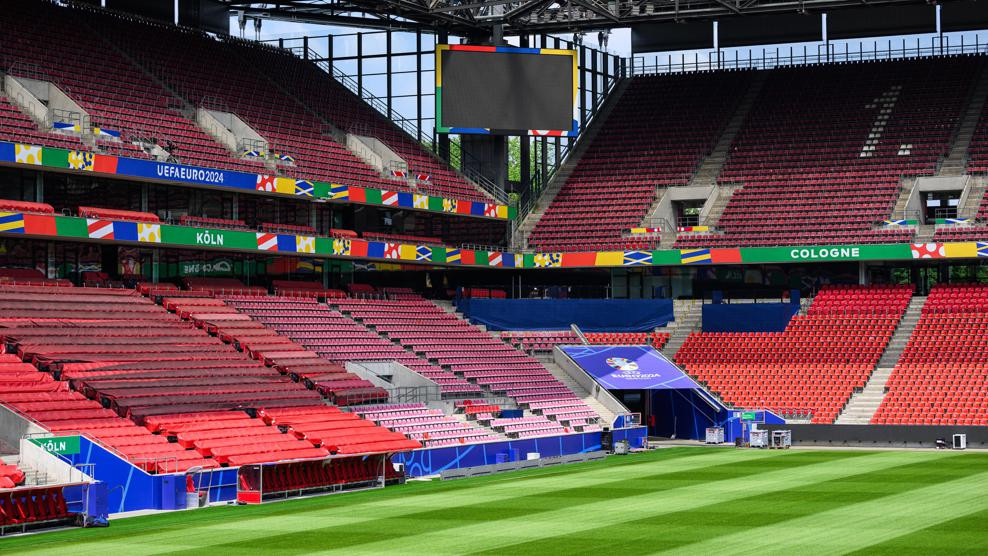 Cologne Stadium – An exterior shot of the modern stadium with its four prominent light towers and red seating visible through the open facade.
Cologne Stadium – An exterior shot of the modern stadium with its four prominent light towers and red seating visible through the open facade.
Cologne, a city steeped in history, graces the banks of the Rhine River and boasts a population exceeding one million. It is home to Germany’s most visited landmark, the magnificent Cathedral Church of Saint Peter, a designated UNESCO World Heritage Site. Cologne offered a blend of cultural richness and football excitement as one of the host cities for EURO 2024, with games held at the Cologne Stadium.
Cologne Stadium: A Legacy of Football and Events
- Stadium Capacity: 43,000
- Home Team: 1. FC Köln
- Notable Events Hosted: 2020 UEFA Europa League Final, 2006 FIFA World Cup Matches
Cologne Stadium, the home of 1. FC Köln, underwent reconstruction to host matches for the 2006 World Cup. Since 2010, it has been the regular venue for the German Women’s Cup final and has also hosted diverse events, including American football, ice hockey, and major music concerts. In 2020, it added another prestigious event to its resume by hosting the UEFA Europa League final.
EURO 2024 Matches in Cologne
- 15/06: Hungary 1-3 Switzerland
- 19/06: Scotland 1-1 Switzerland
- 22/06: Belgium 2-0 Romania
- 25/06: England 0-0 Slovenia
- 30/06: Round of 16 – Spain 4-1 Georgia
Dortmund: BVB Stadion Dortmund
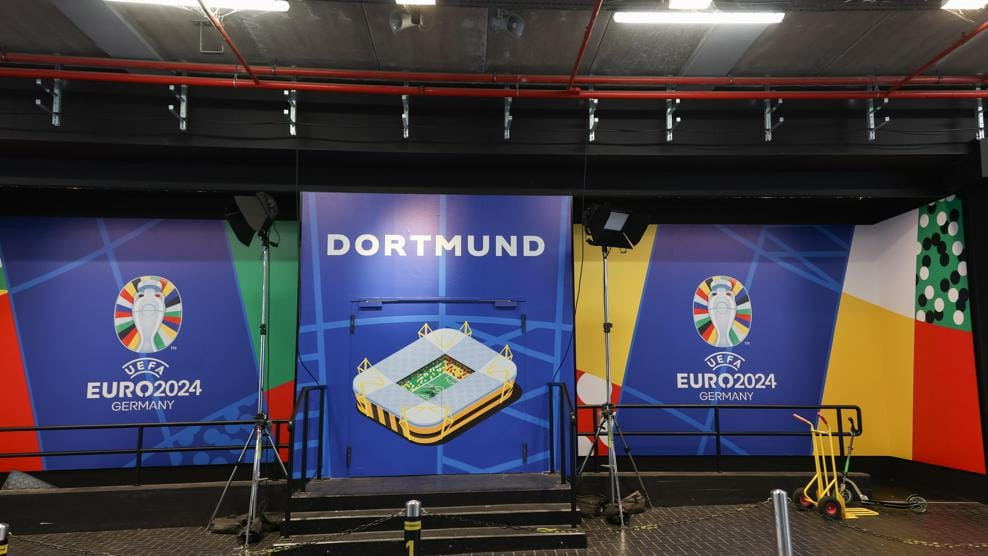 BVB Stadion Dortmund – A view from inside the stadium showing the impressive 'Yellow Wall' stand filled with fans, creating a vibrant atmosphere.
BVB Stadion Dortmund – A view from inside the stadium showing the impressive 'Yellow Wall' stand filled with fans, creating a vibrant atmosphere.
Dortmund, recognized as the cultural heart of the Ruhr region, has transformed dramatically over the past half-century. Once known for coal, steel, and beer, it has evolved into a prominent tech hub, enriched by a dynamic cultural scene and a strong sporting heritage, celebrated at the German Football Museum. Dortmund was a key location for EURO 2024 matches, hosted at the iconic BVB Stadion Dortmund.
BVB Stadion Dortmund: Home of the “Yellow Wall”
- Stadium Capacity: 62,000
- Home Team: Borussia Dortmund
- Notable Events Hosted: 2001 UEFA Cup Final, FIFA World Cup Matches
BVB Stadion Dortmund, globally recognized for its legendary “Yellow Wall” stand, is among the largest and most celebrated football venues worldwide. It has consistently hosted high-profile matches in both World Cups and European championships, including the thrilling 2001 UEFA Cup final between Liverpool and Deportivo Alavés. Its electric atmosphere makes it a standout venue in international football.
EURO 2024 Matches in Dortmund
- 15/06: Italy 2-1 Albania
- 18/06: Türkiye 3-1 Georgia
- 22/06: Türkiye 0-3 Portugal
- 25/06: France 1-1 Poland
- 29/06: Round of 16 – Germany 2-0 Denmark
- 10/07: Semi-final – Netherlands 1-2 England
Düsseldorf: Düsseldorf Arena
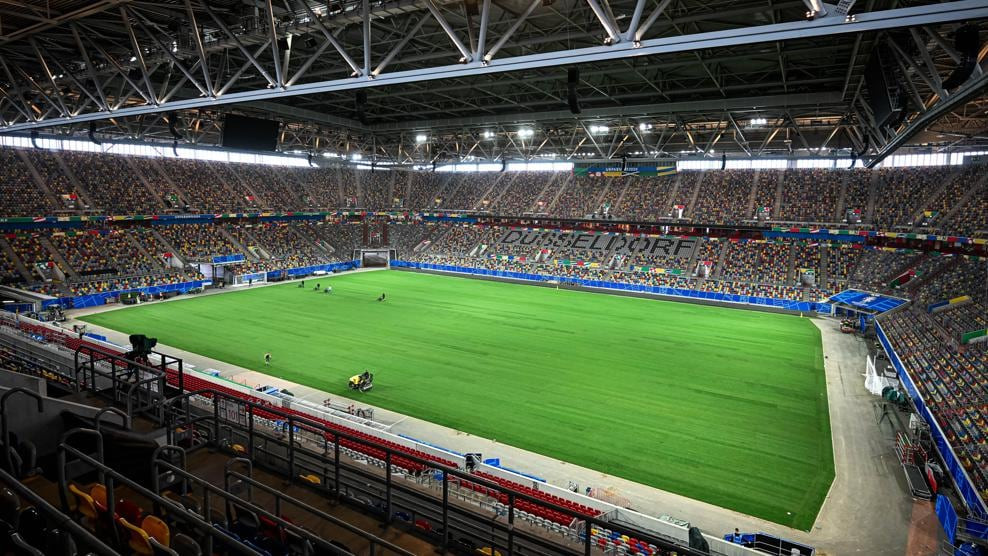 Düsseldorf Arena – An aerial view of the stadium showing its modern design, surrounding parking areas, and proximity to urban infrastructure.
Düsseldorf Arena – An aerial view of the stadium showing its modern design, surrounding parking areas, and proximity to urban infrastructure.
Düsseldorf, the capital of North Rhine-Westphalia, is a city of 650,000 inhabitants, renowned for its vibrant Old Town, often called ‘the longest bar in the world’ due to its over 250 beer houses and restaurants. Düsseldorf offered a unique blend of urban charm and football fervor as a host city for EURO 2024, with matches held at the Düsseldorf Arena.
Düsseldorf Arena: Modern Venue with a History
- Stadium Capacity: 47,000
- Home Team: Fortuna Düsseldorf
- Notable Events Hosted: 1988 UEFA European Championship Group Games (former Rheinstadion)
Düsseldorf Arena, while one of the smaller venues for EURO 2024, still boasts a substantial capacity exceeding 40,000. It serves as the home for Fortuna Düsseldorf, who last competed in the Bundesliga in 2019/20. Historically, the site of the arena, previously known as Rheinstadion, hosted group games during the 1988 UEFA European Championship, marking its long-standing contribution to European football.
EURO 2024 Matches in Düsseldorf
- 17/06: Austria 0-1 France
- 21/06: Slovakia 1-2 Ukraine
- 24/06: Albania 0-1 Spain
- 01/07: Round of 16 – France 1-0 Belgium
- 06/07: Quarter-final – England 1-1 Switzerland (aet, 5-3 on pens)
Frankfurt: Frankfurt Arena
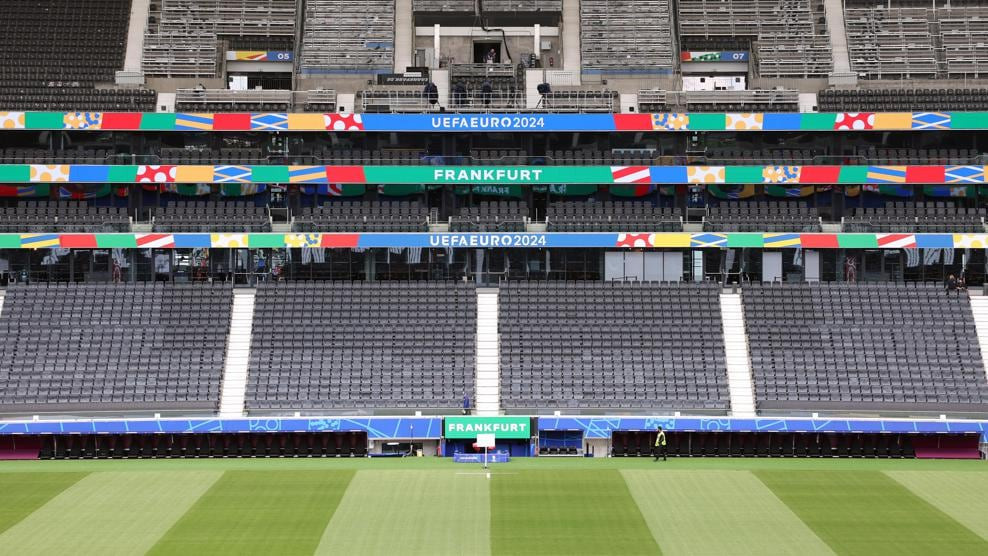 Frankfurt Arena – A wide shot of the stadium from the field level, highlighting the green pitch and the stands ready for a match.
Frankfurt Arena – A wide shot of the stadium from the field level, highlighting the green pitch and the stands ready for a match.
Frankfurt, a global center for commerce and finance situated on the Main River, is Germany’s fifth-largest city. Its distinctive skyline has earned it the nickname ‘Mainhattan’. Frankfurt combined its cosmopolitan flair with football excitement as a EURO 2024 host city, with matches played at the Frankfurt Arena.
Frankfurt Arena: A Stadium with a Rich Tournament History
- Stadium Capacity: 47,000
- Home Team: Eintracht Frankfurt
- Notable Events Hosted: 2002 UEFA Women’s Cup Final, 2006 FIFA World Cup Quarter-final
Frankfurt Arena, home to Eintracht Frankfurt, was originally built in 1925 and has a long history of hosting major tournaments. It has been a venue for both the 1988 UEFA European Championship and the 2006 FIFA World Cup, showcasing its enduring role in international football. Additionally, it hosted the 2002 UEFA Women’s Cup final, further cementing its place in football history.
EURO 2024 Matches in Frankfurt
- 17/06: Belgium 0-1 Slovakia
- 20/06: Denmark 1-1 England
- 23/06: Switzerland 1-1 Germany
- 26/06: Slovakia 1-1 Romania
- 01/07: Round of 16 – Portugal 0-0 Slovenia (aet, 3-0 on pens)
Gelsenkirchen: Arena AufSchalke
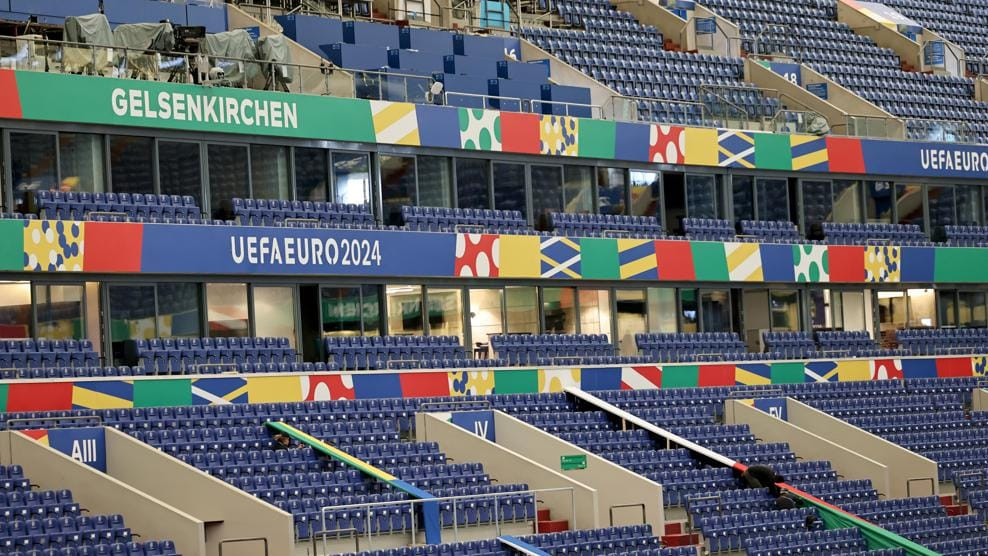 Arena AufSchalke – An exterior view of the stadium showing its modern architecture, curved roof, and surrounding greenery.
Arena AufSchalke – An exterior view of the stadium showing its modern architecture, curved roof, and surrounding greenery.
Gelsenkirchen, while historically known for coal mining and steelmaking, has evolved into a city offering green spaces, theaters, and boat cruises. It retains its industrial heritage in the Ruhr region but now presents a diverse appeal to visitors. Gelsenkirchen contributed to the EURO 2024 excitement by hosting matches at the innovative Arena AufSchalke.
Arena AufSchalke: Innovation and Football Excellence
- Stadium Capacity: 50,000
- Home Team: Schalke
- Notable Events Hosted: 2004 UEFA Champions League Final, 2006 FIFA World Cup Quarter-final
Arena AufSchalke, opened in August 2001, is the home of Schalke, a seven-time German champion and 1996/97 UEFA Cup winner. This modern stadium features a retractable roof and a slide-out pitch, showcasing engineering innovation. It hosted the 2004 UEFA Champions League final and a memorable 2006 World Cup quarter-final where Cristiano Ronaldo and Portugal defeated England in a penalty shootout.
EURO 2024 Matches in Gelsenkirchen
- 16/06: Serbia 0-1 England
- 20/06: Spain 1-0 Italy
- 26/06: Georgia 2-0 Portugal
- 30/06: Round of 16 – England 2-1 Slovakia (aet)
Hamburg: Volksparkstadion Hamburg
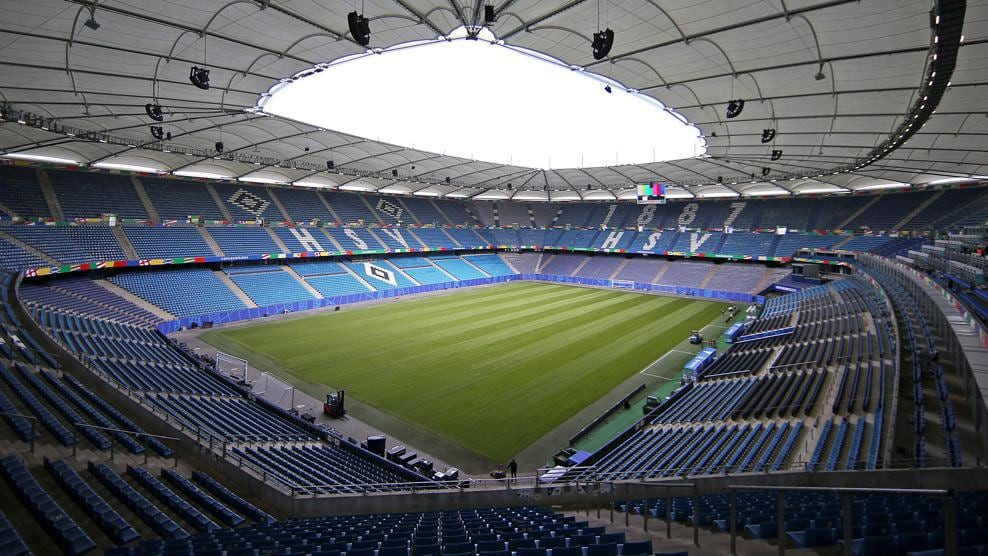 Volksparkstadion Hamburg – A dynamic shot from the corner of the stadium showing the pitch and stands during what appears to be a match or event preparation.
Volksparkstadion Hamburg – A dynamic shot from the corner of the stadium showing the pitch and stands during what appears to be a match or event preparation.
Hamburg, the third-largest European city not a national capital, is a major global port city. It boasts a world-renowned harbor, a rich cultural history, impressive architecture, and vibrant nightlife, making it a sought-after destination for tourists worldwide. Hamburg added to its appeal by being a host city for EURO 2024, with matches held at the Volksparkstadion Hamburg.
Volksparkstadion Hamburg: A Blend of History and Modernity
- Stadium Capacity: 49,000
- Home Team: Hamburger SV
- Notable Events Hosted: 2010 UEFA Europa League Final, 2006 FIFA World Cup Quarter-final
Volksparkstadion Hamburg first opened in 1953 and underwent significant modernization in 2000. It has hosted matches at the 1988 UEFA European Championship, as well as the 1974 and 2006 World Cups, demonstrating its long-standing presence in international football. In 2010, it hosted the UEFA Europa League final, further highlighting its capacity to stage major European football events.
EURO 2024 Matches in Hamburg
- 16/06: Poland 1-2 Netherlands
- 19/06: Croatia 2-2 Albania
- 22/06: Georgia 1-1 Czechia
- 26/06: Czechia 1-2 Türkiye
- 05/07: Quarter-final – Portugal 0-0 France (aet, 3-5 on pens)
Leipzig: Leipzig Stadium
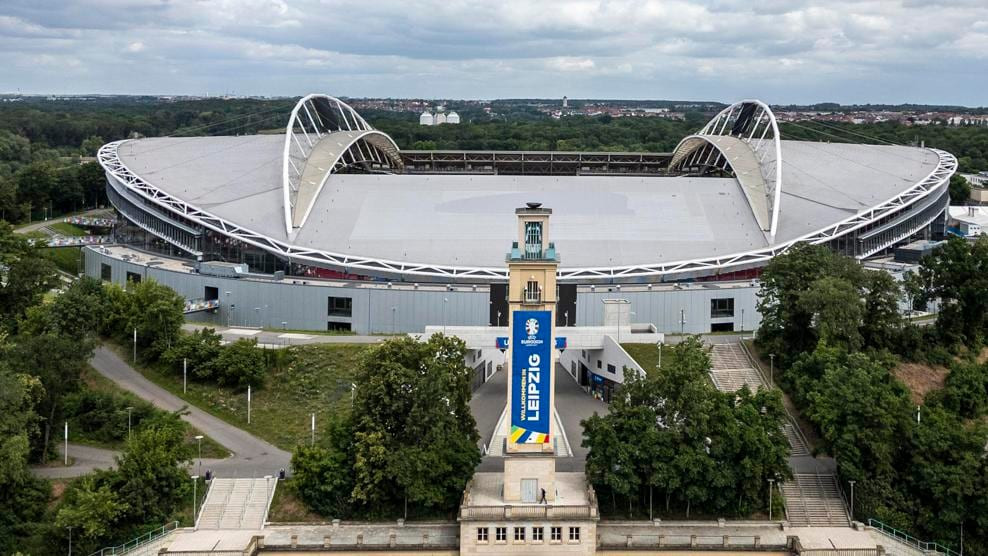 Leipzig Stadium – An elevated view of the stadium at night, showcasing its illuminated roof structure and the surrounding city lights.
Leipzig Stadium – An elevated view of the stadium at night, showcasing its illuminated roof structure and the surrounding city lights.
Leipzig, historically home to Johann Sebastian Bach, is a city rich in culture and history. It is particularly noted for the peaceful demonstrations in 1989, which were pivotal in Germany’s reunification. Leipzig combined its historical significance with modern football excitement as a EURO 2024 host city, with matches at the Leipzig Stadium.
Leipzig Stadium: Rebuilt for the Future of Football
- Stadium Capacity: 40,000
- Home Team: RB Leipzig
- Notable Events Hosted: 2006 FIFA World Cup Group Stage and Round of 16 Games
Leipzig Stadium, home to Bundesliga team RB Leipzig, opened in 2004. It was uniquely constructed within the shell of the old Zentralstadion, formerly the largest stadium in East Germany, blending historical elements with modern design. The stadium, featuring a state-of-the-art roof, hosted matches during the 2006 World Cup, including group stage and round of 16 games.
EURO 2024 Matches in Leipzig
- 18/06: Portugal 2-1 Czechia
- 21/06: Netherlands 0-0 France
- 24/06: Croatia 1-1 Italy
- 02/07: Round of 16 – Austria 1-2 Türkiye
Munich: Munich Football Arena
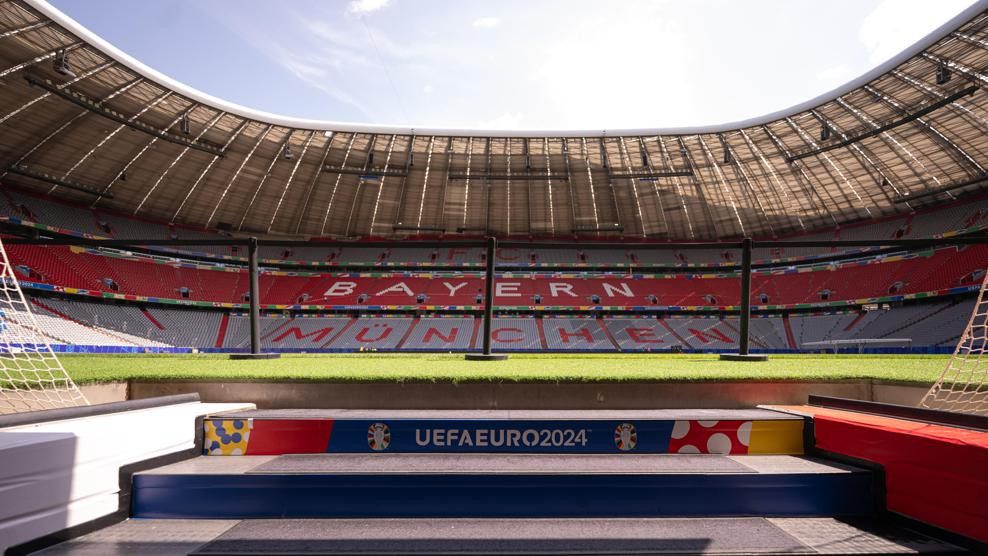 Munich Football Arena – An exterior shot of the stadium showing its inflatable panel facade and modern, rounded design.
Munich Football Arena – An exterior shot of the stadium showing its inflatable panel facade and modern, rounded design.
Munich, home to approximately 1.6 million residents, is Germany’s third-largest city. It is a destination rich in history, art galleries, parks, and traditional beer gardens, offering a blend of cultural and recreational attractions. Munich was a premier host city for EURO 2024, with games played at the impressive Munich Football Arena.
Munich Football Arena: A Modern Icon of German Football
- Stadium Capacity: 66,000
- Home Team: Bayern Munich
- Notable Events Hosted: 2012 UEFA Champions League Final, EURO 2020 Quarter-final
Munich Football Arena, initially built jointly by local rivals Bayern Munich and 1860 München, opened in 2005, with Bayern later taking full ownership. It famously hosted the 2012 Champions League final, where Chelsea defeated Bayern in a dramatic penalty shootout, and also served as a venue for several UEFA EURO 2020 matches, including Italy’s quarter-final victory over Belgium.
EURO 2024 Matches in Munich
- 14/06: Germany 5-1 Scotland
- 17/06: Romania 3-0 Ukraine
- 20/06: Slovenia 1-1 Serbia
- 25/06: Denmark 0-0 Serbia
- 02/07: Round of 16 – Romania 0-3 Netherlands
- 09/07: Semi-final – Spain 2-1 France
Stuttgart: Stuttgart Arena
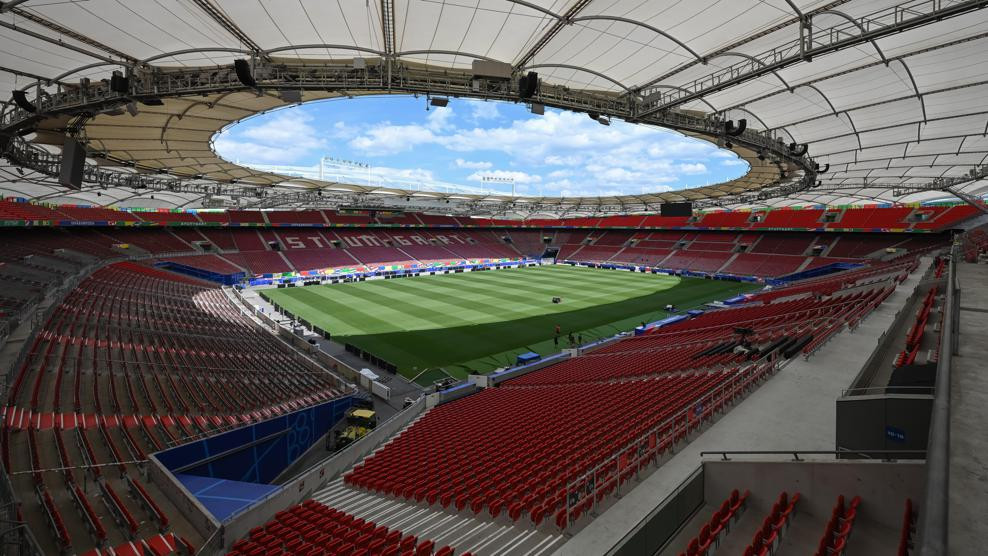 Stuttgart Arena – An inside view of the stadium with its stands and pitch, taken during daylight and showing the seating arrangement.
Stuttgart Arena – An inside view of the stadium with its stands and pitch, taken during daylight and showing the seating arrangement.
Stuttgart, a major industrial city, is home to global automotive giants Mercedes and Porsche. Beyond its industrial strength, Stuttgart offers a rich winemaking and culinary scene, with local specialties like Flädlesuppe (pancake soup). Stuttgart was a host city for EURO 2024, with matches played at the modernized Stuttgart Arena.
Stuttgart Arena: Continuously Evolving Football Venue
- Stadium Capacity: 51,000
- Home Team: VfB Stuttgart
- Notable Events Hosted: 1998 European Cup Final, 2006 FIFA World Cup Third-Place Play-off
Stuttgart Arena, built in 1993, has undergone several renovations and modernizations. It has hosted matches in the 1974 and 2006 World Cups, and the 1988 UEFA European Championship, marking its consistent contribution to major football tournaments. It also hosted the 1998 European Cup final, showcasing its versatility and importance in European football.
EURO 2024 Matches in Stuttgart
- 16/06: Slovenia 1-1 Denmark
- 19/06: Germany 2-0 Hungary
- 23/06: Scotland 0-1 Hungary
- 26/06: Ukraine 0-0 Belgium
- 05/07: Quarter-final – Spain 2-1 Germany (aet)
UEFA EURO 2024 Tournament Dates
The UEFA EURO 2024 final tournament spanned a month of thrilling football action, taking place from June 14 to July 14, 2024.
EURO 2024 Qualified Teams
The tournament featured Europe’s top national teams, drawn into groups following the final tournament draw on December 2, 2023, in Hamburg.
Group A: Germany, Scotland, Hungary, Switzerland
Group B: Spain, Croatia, Italy, Albania
Group C: Slovenia, Denmark, Serbia, England
Group D: Poland, Netherlands, Austria, France
Group E: Belgium, Slovakia, Romania, Ukraine
Group F: Türkiye, Georgia, Portugal, Czechia

